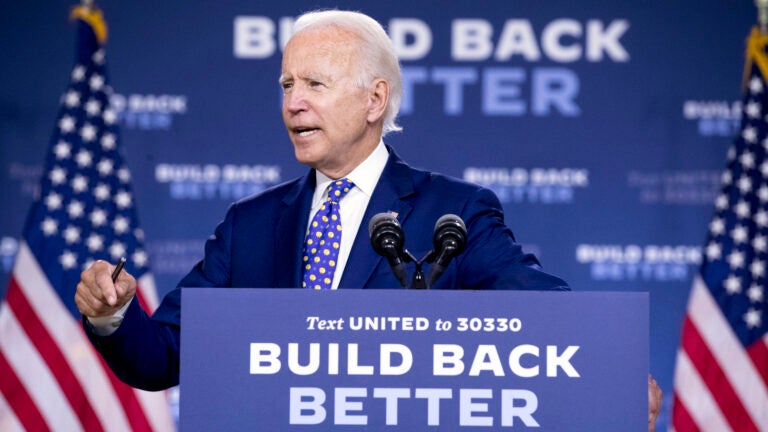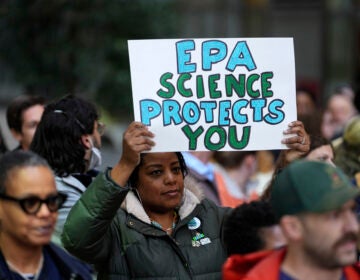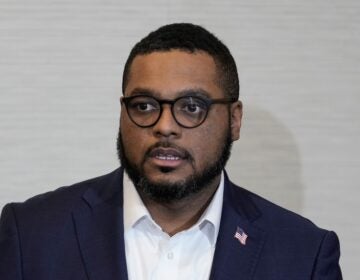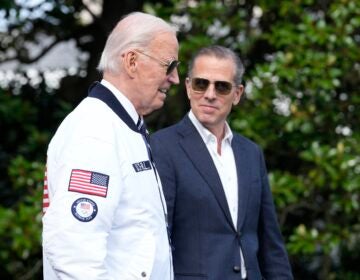First-time Pa. DNC delegates prepare to nominate Joe Biden virtually
The DNC’s selection process is designed to yield delegates who vary widely in race, age and background. Their political priorities can also vary widely.

Democratic presidential candidate former Vice President Joe Biden speaks at a campaign event in Wilmington, Del., Tuesday, July 28, 2020. IAndrew Harnik/AP Photo)
This week, for the first time, Philadelphia union organizer Wynetta Ward is going to be a delegate at the Democratic National Convention.
Getting picked is a long, complicated process, and this year is going to be unusual. Instead of heading to Milwaukee, Wisconsin, where the convention was initially supposed to be held, everything will happen remotely due to coronavirus concerns.
But Ward said she decided this was an important year to take the plunge.
“I felt like I wanted people to be more represented in the Democratic process,” said Ward, who is Black. “Women, minorities, brown people, unions. Just different people to be involved.”
Ward is one of 210 delegates — and 16 alternates — who will represent Pennsylvania Democrats at this week’s convention.
It’s a diverse group.
The party’s selection process for district-level and at-large delegates — the group that includes regular people, not just elected officials — explicitly balances the delegates by gender, and includes an “affirmative action” plan aimed at choosing members who are “historically under-represented in the Democratic Party’s affairs.”
That includes African American, Hispanic, Native American, Asian American and Pacific Island voters, women, young people, people with disabilities and LGBTQ+ people. They had to decide to run to be delegates before the pandemic hit and before they knew the convention would be held virtually.
The group tends to include people who are already active in local politics. But beyond that, they vary widely. Delegates include small business owners, students, union organizers, local party leaders and teachers.
And it’s not just their backgrounds that are diverse. Despite the fact that they’re all embarking on the same political task, their feelings about the Democratic party — and about what being a delegate means — vary widely.
Here’s a look at how three Philly-area delegates are approaching the job.
Ward, 50, works for Verizon, lives in the city, and is a unit president for her union, CWA Local 13000.
She said, along with wanting better representation in the Democratic party, she became a delegate because she’s hoping to get a better handle on the democratic process. Right now, with nearly four years of Donald Trump’s presidency in the rearview mirror, she said it feels especially important to be engaged.
“I feel like everything is under attack right now,” she said.
She has a long list of issues she wants to see addressed: policing reform, protection of labor laws, funding for education, equal opportunities for women and people of color, equal pay.
She’s a longtime Democrat, and trusts the party to address her concerns — though she doesn’t think Democratic leaders are above reproach.
Her top issues, she said, “are not completely addressed, but they’re working towards being addressed throughout the Democratic Party. I’ve always found that that’s the party that kind of carried the mantle for issues that face unions and minorities, Black people.”
But, she added, she likes and trusts Joe Biden and was happy to see U.S. Sen. Kamala Harris of California join his ticket.
“I think it has energized his campaign — not that we weren’t already energized enough,” she said.
Like Ward, Mona Getzes Cohen — a delegate for Joe Biden who lives in North Philadelphia — is a longtime Democrat. But she’s no stranger to politics.
She’s a Democratic State Committee member and her husband, Mark Cohen, spent decades as a state representative and is now a judge on Philadelphia’s Court of Common Pleas.
Getzes Cohen, who describes herself as a “senior,” is also a special education teacher and said one of her top issues is education funding, and making sure necessary services for people in need are funded.
Asked why she decided to be a Biden delegate, she laughed. “How long do you have?” she asked. “I love him.”
She first met Biden at the DNC in 2008 — she wasn’t a delegate then — and said she felt he had a “real gift” for making people feel heard. She likes that he’s experienced and has established relationships with foreign leaders, she thinks he is empathetic and, most importantly, she thinks he’ll bring “stability” to the country.
That stability, she said, is probably her top priority. She liked the state of politics before Trump much better, she said, and she wants it to return.
Another Philly delegate, Anlin Wang, said he’s not looking for a return to “normal.”
Wang, 27, is one of the 39 delegates who have committed to casting their votes for U.S. Sen. Bernie Sanders of Vermont, who technically withdrew from the presidential race several months ago but kept his hat in the ring for the DNC in an effort to push the Democrats left.
Wang is involved in his local Democratic Socialists of America chapter, works with Reclaim Philadelphia on judicial reform, and the Asian Pacific Labor Alliance among other efforts.
Asked what his political priorities are, his first and foremost answer is climate change. He really wants to see the Green New Deal become law.
He also wants universal childcare, a jobs guarantee, more housing availability, higher wages, universal internet and food access, criminal justice reform, and better environmental health hazard mitigation.
“I really think that, in the richest country in the history of the world, people really are entitled to a basic minimum standard of living,” he said.
He said he’s hoping casting his vote for Sanders will help push the Democratic Party left. But he added, come November, he’s going to vote against Trump — even if he’s not particularly satisfied with his other option.
“In all likelihood, I’ll be voting for Joe Biden in the general election,” he said.

Your go-to election coverage
WHYY is your source for fact-based, in-depth journalism and information. As a nonprofit organization, we rely on financial support from readers like you. Please give today.






